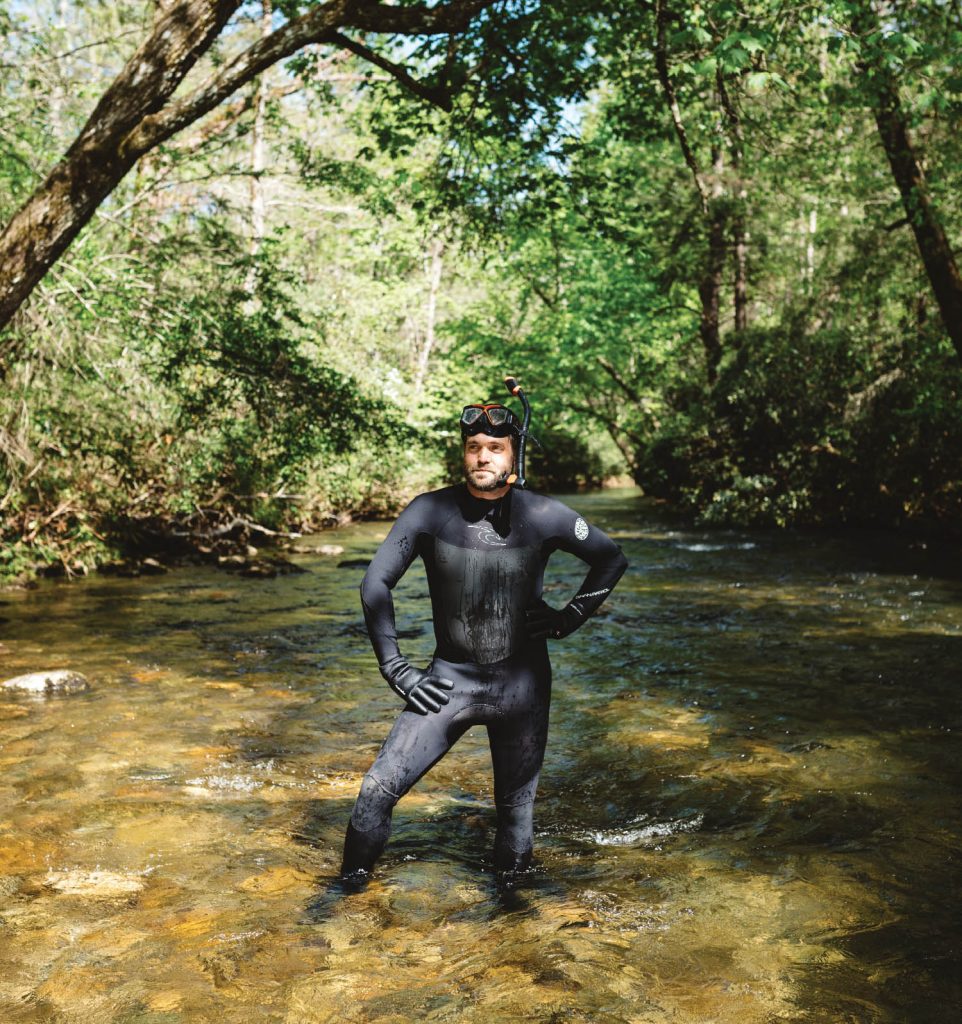Event shows what’s at the bottom of the food chain (and the river)

Photo by Rachel Pressley
As most of us have been taught in school, food chains are extremely dynamic. The big creatures eat the smaller creatures, and the smaller creatures apparently just live their lives waiting to be eaten. But it actually goes much deeper than that — as deep as the bottom of Transylvania County’s Davidson River.
Daniel Manget, a 36-year-old Education Specialist at the Pisgah Center for Wildlife Education, will lead his first adult snorkeling program this month. Participants will learn about types of macro-invertebrates, or spineless aquatic insects, that can be seen underwater. These include crayfish (“crawdads”) and many fly species such as stone, may, and caddis — immature versions of flies typically seen in the air.

“They’re an important layer in the food system,” Manget explains from his office, in a rare moment indoors. “Without them, you don’t have trout.”
And trout fishing is crucial to the culture of the Davidson, an attractive national destination for fly fishers because of its water purity, density of fish, and easy accessibility from surrounding banks. The Center is located on the Davidson next to a trout-fish hatchery in the more than 500,000 acres that is Pisgah National Forest. The facility focuses on the preservation of the area’s hardwood forests, whitewater rivers, and waterfalls, implementing programs for hunters, anglers, boaters, and other outdoor enthusiasts to responsibly enjoy the hundreds of miles of trails and recreation areas.
Manget leads classes in all seasons, and for all ages, including public and private groups. He takes participants on expeditions to practice fly fishing, enjoy birding, conduct stream investigations, and learn survival skills (including fire building) and snorkeling.
“People normally go snorkeling in the ocean,” Manget points out. “Why do they do it? To see cool things. People also go to rivers to see cool things, but here we are much closer to the bottom, making it easier to lift up rocks and see the organisms. There is much more life in a river than people realize. It’s the new way of observing wildlife and all of the interesting creatures that are here.”

Photo by Rachel Pressley
The educator was raised with a strong understanding that everything in the environment is interdependent — even the living organisms that are hard to find, and, in many situations, difficult to see. His father was a botanist, so Manget played a lot in the creek in his backyard, and also attended a “Kids in the Creek” camp — a direct inspiration for his later career.
He received a degree in Outdoor Education, with an emphasis in Environmental Education, from Georgia College & State University in Milledgeville, and interned at the Smithgall Woods-Dukes Creek Conservation Area, another trout destination — this one located in the mountainous portion of North Georgia, not far from Nantahala National Forest in NC. Manget was employed by the Blue Ridge Parkway as an interpretive ranger, taught as a 5th-grade science teacher, and worked at a science museum in downtown Asheville.
“I’m really a jack of all trades, a master of none,” exclaims Manget. “Although I spend most of my days working with children, I feel like I have a lot of skills to offer adults, as well. Teaching adults allows me to use the skills I’ve learned to get a little more in depth on specific topics.”
Manget hopes that adults will have an easier time learning to more specifically identify fish and insects while snorkeling. He also expects that adults will have more patience to swim behind the creatures and observe their behaviors.
Pisgah National Forest, one of the largest hosts of field trips in North Carolina, sees more than 1,000 students every week. Visitors per year top more than 5 million. To pinpoint the impacts the river is facing, scientific studies are constantly being conducted, including a recent one where multiple organizations came together to study runoff from the foot traffic that tourists create.
But while the Davidson is undeniably popular, it remains one of the least polluted rivers in Western North Carolina. “I think it’s so clean because a large portion of the river stretches through the [federally protected] national forest,” Manget says. “As soon as the rivers exit the protected forests, it’s much more difficult to see [aquatic life]. Unlike the French Broad [River], the Davidson is clear enough in most sections to see the bottom. We take good care of it here.”
He continues, “It’s important to understand that if this river is good enough for the trout that people come from all over to fly fish for, it’s good enough for a lot of different species.”

This includes the countless under-appreciated organisms that dwell in the Davidson’s depths. Protecting the river, says Manget, is about protecting the insects. “For example, mud [due to runoff from human activity] is a major pollutant we deal with in a river. When the water warms up, it covers the rocks that these species live under.”
While snorkeling, Manget is able to tell a lot about the current health of the river system. “Each insect present has a certain sensitivity to pollution,” he says. “They serve as bio-indicators. Just by their presence, they can help you determine the water quality of the river.”
The educator says his job, underneath it all, is about inspiration — helping others get as excited as he is about the many opportunities to protect the environment. “I just want to blow people’s minds about nature.”
The Pisgah Center for Wildlife Education (1401 Fish Hatchery Road, Pisgah Forest) hosts “Snorkeling in the Stream” Thursday, June 13, 9am-12pm (ages 8 and up) and “Adult Snorkeling” Saturday, June 29, 10am-1pm (ages 16 and up). Equipment is provided; wear a swimsuit and bring a towel. Register online at ncwildlife.org/pisgah/signup or call 828-877-4423 for more information.



